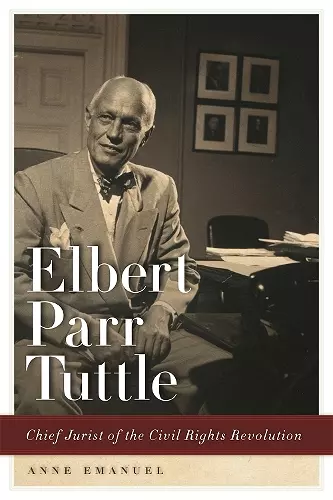Elbert Parr Tuttle
Chief Jurist of the Civil Rights Revolution
Format:Paperback
Publisher:University of Georgia Press
Published:15th Oct '14
Currently unavailable, and unfortunately no date known when it will be back

The previously untold life story of a remarkable civil rights champion
This is the first—and the only authorized—biography of Elbert Parr Tuttle (1897–1996), the judge who led the federal court with jurisdiction over most of the Deep South through the most tumultuous years of the civil rights revolution.
This is the first—and the only authorized—biography of Elbert Parr Tuttle (1897–1996), the judge who led the federal court with jurisdiction over most of the Deep South through the most tumultuous years of the civil rights revolution. By the time Tuttle became chief judge of the United States Court of Appeals for the Fifth Circuit, he had already led an exceptional life. He had cofounded a prestigious law firm, earned a Purple Heart in the battle for Okinawa in World War II, and led Republican Party efforts in the early 1950s to establish a viable presence in the South. But it was the intersection of Tuttle’s judicial career with the civil rights movement that thrust him onto history’s stage.
When Tuttle assumed the mantle of chief judge in 1960, six years had passed since Brown v. Board of Education had been decided but little had changed for black southerners. In landmark cases relating to voter registration, school desegregation, access to public transportation, and other basic civil liberties, Tuttle’s determination to render justice and his swift, decisive rulings neutralized the delaying tactics of diehard segregationists—including voter registrars, school board members, and governors—who were determined to preserve Jim Crow laws throughout the South.
Author Anne Emanuel maintains that without the support of the federal courts of the Fifth Circuit, the promise of Brown might have gone unrealized. Moreover, without the leadership of Elbert Tuttle and the moral authority he commanded, the courts of the Fifth Circuit might not have met the challenge.
In her thorough and engaging biography of Tuttle, Georgia State University law professor Anne Emanuel has documented Tuttle's extraordinary life. For those interested in America's racial history and transformation, this book is a must— a tour de force, covering not just Tuttle but the often violent times he lived in.
* NPR.org *[T]hroughout the biography, [Emanuel] produces nugget after nugget of Tuttle's rich, full life. . . . Emanuel is also at her best recounting, in riveting passages, the landmark civil rights cases Tuttle presided over as chief judge of the 5th Circuit during the turbulent 1960s.
* Atlanta Journal-Constitution *Anne Emanuel admirably describes the career—in war, politics, and law—of a judge who was at the center of enforcing civil rights law in the 1960s. Full of interesting detail, Elbert Parr Tuttle tells us much about how one person’s life can shape the law.
* William Nelson Cromwell Professor of Law, Harvard Law School *The simple truth is that Elbert Tuttle made it possible to overcome white southern resistance to the end of racial segregation. As chief judge of the United States Court of Appeals for the Fifth Circuit, covering the Deep South, he rejected all the state legal dodges, the recalcitrance of judges and governors. Anne Emanuel has written a thrilling portrait of this man of conscience and courage.
* former columnist, New York Times *Anne Emanuel's important new book, Elbert Parr Tuttle, reminds us that some legal conflicts are destined to come down to a judge and an angry mob.
* The Atlantic *If Earl Warren led the Supreme Court in finding public school racial segregation unconstitutional in its 1954-55 rulings in Brown vs. Board, Elbert Tuttle led the federal judiciary's enforcement of that ruling throughout the Deep South. Anne Emanuel leaves no doubt of this in her biography. But beyond the legal what, why and how of Tuttle's actions as chief judge of the old Fifth Circuit Court of Appeals' bench in Atlanta, she also recounts the personal history that, other than law and precedent, must have motivated him. Would that this background had been readily available to those of us who reported the civil rights struggle in the critical years of the 1960s.
* New York Times correspondent and national editor, 1958-1968 *The role of federal judges in the civil rights movement has been studied thoroughly, but Anne Emanuel has a larger story to tell about the man who served as chief judge of the largest appeals court in the South during the heyday of court-ordered racial desegregation. Elbert Tuttle, raised in Hawaii and educated in New York, led a remarkable life long before being appointed to the bench. He was active working to promote civil liberties during the 1930s, went to war in middle age and became a decorated combat veteran, and helped to secure Dwight Eisenhower’s nomination for President during the bitter 1952 Republican Convention. All the while he was a quiet, unassuming father of two and co-partner in one of the most successful law firms in the region. Emanuel knew the judge, has mined his working papers, and writes with a sure feel for this modest man who cast such a large shadow over his adopted South.
* William Rainey Harper Professor in the College and Senior Lecturer in Law, University of Chicago *I have read the biography of Judge Tuttle, written by one of his former law clerks . . . and I commend it to everybody in the room to learn about what kind of a judge Elbert Tuttle was. He was really a surprisingly fine judge.
ISBN: 9780820347455
Dimensions: unknown
Weight: unknown
440 pages